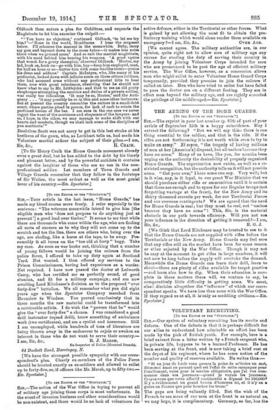THE ARMING OF THE HOME GUARDS.
[TO THE EDITOR OF TR. "SPECTATOR."] Sin,—The reprint in your last number (p. 834) of part of your article of September 12th is s. happy coincidence. May I extract the following? "But we will say this : there is one thing essential to the soldier, and that is the rifle. If the rifles are not forthcoming it is not worth while even to try to make an army." Et supra, "the tragedy of having millions of men at her [America's] disposal, but all useless because they have no arms." Many of us have, like you, for months been urging on the authority the desirability of properly organized Home Guards. The organization now exists, as well as a re- stricted recognition, but the authority tells us it will not provide arms. " Get your own," I hear some one say. Very well; but is it wise, nay, is it loyal, to our great War Minister that we should purchase either rifle or ammunition until it is certain that there are enough and to spare for our Regular troops (not forgetting wastage at the front), for the New Army and its thirty thousand recruits per week, for our Territorial Forces and our overseas contingents ? We are agreed that the need for Home Guards is real ; but they must be real, not "useless because they have no arms " I This, Sir, is the material obstacle in our path towards efficiency. Will you not use your influence in the direction of getting it removed ?—I am, [We think that Lord Kitchener may be trusted to see to it that the Home Guards are not supplied with rifles before the Territorials or the New Army. Home Guards may feel sure that any rifles still on the market have been for some reason or other rejected by the War Office. Though it may not be easy at the moment to get rifles in large numbers, it will not now be long before the supply will overtake the demand. Meanwhile the Home Guards can learn their drill, learn to shoot—there are plenty of rifles available for target practice —and learn also how to dig. When their education is com- plete in these matters there will, we venture to say, be comparatively little difficulty in getting arms. We must, alas ! disclaim altogether the " influence " of which our corre- spondent speaks. We have less than none with the War Office. If they regard us at all, it itionly as meddling civilians.—En. Spectator.]






































 Previous page
Previous page